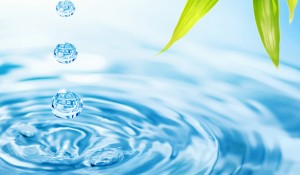Water retention, also called edema in medical terminology, represents the accumulation of excess fluid in body tissues. Between the tissues and blood plasma there is a continuous exchange of liquids. Water retention occurs when the fluid cannot be reabsorbed into the bloodstream or as the fluid passes in a large amount in tissue near blood vessels. The changes can be seen with the naked eye in the hands, legs, or abdomen that get a swollen appearance.
Although it may seem contradictory when our body suffers from dehydration, retains water as a method of survival. Drinking enough water, fruit juices, herbal teas and other beverages without caffeine, allow the body to drain and eliminate body fluids properly. Water retention or more correctly fluid salt retention, because it combines retaining water and minerals and is a symptom that can notify very serious diseases. It is manifested by the appearance of swelling, initially in the lower areas of the body due to the action of gravity, then, if the main disease persists. Water retention can have unpleasant effects such as bloating and swollen ankles.
Water can be accumulated and localized for example only in the abdominal cavity, which leads to distension of the abdomen sometimes up to huge proportions (the phenomenon is called ascites).
 In many people, some of the extra pounds actually represent water retention in the tissues, a phenomenon that occurs in the body when there is an imbalance between fluid intake and the amount of water removed. Women can hold water in the body in so-called premenstrual syndrome. In the period before menstruation, hormonal fluctuation occurs and, in some women, excess estrogen can temporarily stimulate the secretion of aldosterone, resulting in water retention. Even headache occurred in the premenstrual period may be the result of water retention in the body.
In many people, some of the extra pounds actually represent water retention in the tissues, a phenomenon that occurs in the body when there is an imbalance between fluid intake and the amount of water removed. Women can hold water in the body in so-called premenstrual syndrome. In the period before menstruation, hormonal fluctuation occurs and, in some women, excess estrogen can temporarily stimulate the secretion of aldosterone, resulting in water retention. Even headache occurred in the premenstrual period may be the result of water retention in the body.
There is a close relationship between hypertension and water retention. The high blood pressure can be caused by too much fluid in the blood vessels, or the presence of water in narrowed blood vessels. Renal disorders accompanied by nephritic syndrome, cardiac insufficiency, liver cirrhosis and thyroid disorders are just few of the hypostases occur in fluid retention.
Other causes of fluid retention may be standing for a long time, very high fever, pregnancy, unhealthy diet, taking certain medications, etc.
As it is said, water retention can have many different causes, but there are remedies available to everyone for this problem. It may seem strange, but one of the reasons for water retention is dehydration. The body feels “dry” but retains some fluids which it has already. Drinking sufficient water promotes a proper balance of the body fluids and the elimination of excess body fluids.
Salt promotes water retention of fluids in general, so low sodium foods are to be chosen and avoid adding excess salt in dinner. Surprisingly, the salt can be found in foods such as breads and cereals, so the list of ingredients on the products must be studied carefully before buying any food product. Restricting salt intake is important because excess of salt favors the emergence of diseases such as hypertension. Our body tries to eliminate salt through the kidneys, urine, with the vital contribution of the water. As we drink more water, the water quickly eliminated from the body. Also, reducing alcohol consumption is important in case of water retention, as the body already retains fluids naturally, so drinking alcoholic beverages is avoided.
In case of protein intake, the body will get rid of excess fluids whereas high protein diets result in a decreased bodyweight. A measure that can be adopted at home by everyone who is having water retention is resting leg, means lying with elevated legs.
A variety of herbs can come to help for people suffering from water retention. These herbs act on the liver, kidneys and on the entire lymphatic system, in order to “drain” excess water from tissues by stimulating blood microcirculation. Examples of such herbs are: nettle, dandelion, horsetail, birch, ash, restharrow root, corn silk, cherry stems, burdock, coriander, cleavers, green tea, etc. Used in the form of cold macerated crushed herbs or powder made in amount of about 1.5 liters daily. These herbs exert diuretic and depurative effects, contributing in the removal of excess water from the body.




